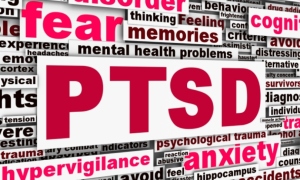If you had surgery as a baby before the 1990s, it is quite possible this has resulted in undiagnosed post-traumatic stress disorder (PTSD), with its clear symptoms probably undiagnosed. The general belief that babies don’t feel or remember pain was conclusively challenged in 1987 and thereafter gradually abandoned (see my previous post). Until this research was published much infant surgery included the use of a paralysing drug to keep a baby still but it gave the baby no general anesthetic because of its hazards. Some local numbing or a sugar cube was all the infant was deemed to need.
 However, the symptoms of PTSD caused by infant surgery may be hard to diagnose.
However, the symptoms of PTSD caused by infant surgery may be hard to diagnose.
Problem #1: Very few if any of us have conscious memories of our first years.
Problem #2: It has been established that a traumatic event of even very early infancy will affect the body (“somatic memory”) for life in ways similar to how conscious memories affect us.
Problem #3: Some of the signs of PTSD are similar to certain character traits.
So diagnosis takes special care, awareness and thoroughness.
The work and therapy of Dr Louis Tinnin is very important in this regard: his post on infant surgery is a “must read”, together with the lengthy discussion that follows it. This is Dr Tinnin’s paragraph on the possible symptoms of PTSD after infant surgery –
Adult survivors report life-long symptoms of anxiety (constant nervousness and spells of terror or panic), hostility (temper outbursts and urges to smash or break things), depression, self-consciousness, distrust of others, and a high vulnerability to stress. The life-long aspect of these symptoms leads to the faulty clinical perception that they are personality disorders instead of recognizing them as persisting reactions first elicited by the brutal surgery. That recognition opens the way to curative treatment of the adult survivor.
He then adds 10 diagnostic questions –
1) Did you have an infant operation before 1987? If so, what was it?
2) How old were you then and how old are you now?
3) Do you feel it has affected you over the course of your life constantly, only at times, or not at all?
4) How would you describe your symptoms or if no evident symptoms then your quality of life in general?
5) Had you connected the operation with your symptoms and if so how did you make that determination?
6) How long have you been aware of this connection? If not aware have you suspected there was something deeper at work in your life that you did not understand?
7) Have you sought treatment and if so what kind? How did you feel about its effectiveness?
8) Was the operation ever discussed with you, as a child, as an adult? What importance did your parents or caregivers place on its possible long-term effects if any?
9) Have you ever considered suicide?
10) Do you believe your life can improve with proper treatment?
In a Comment on this post, one of the people greatly affected by his early surgery for pyloric stenosis (PS) “fleshed out” Dr Tinnin’s information with his own experience –
 Wondering “why”. Why did they hurt me? Why did they keep me away from my mother and father? Did I do something wrong which caused me to be punished?
Wondering “why”. Why did they hurt me? Why did they keep me away from my mother and father? Did I do something wrong which caused me to be punished?- The last question has led me to blame myself and conclude that there must be something wrong with me. Otherwise, they would not have tortured me.
- Extreme sensitivity to criticism.
- Fear of abandonment.
- Heightened fear of death and all things associated with it like hospitals, doctors, nursing homes.
- Desire to hide or disappear in stressful situations and fantasies of invisibility – in hopes I can escape notice by those who wish to do me harm.
- Withdrawal tendencies, especially in crowded rooms.
- Introversion.
- Difficulty with small talk, initiating conversations.
- Submission to authority figures.
I have found it unusually difficult to self-diagnose. We need to be involved in another’s diagnosis of our personal health or other problems, but we need somebody else who knows us well and knows their subject well to walk with us in diagnosing PTSD after early surgery. Allow me to reflect personally.
I must answer almost all of Dr Tinnin’s 10 Questions with my “Yes!”
The same is true of 10 points which the doctor’s Comment-poster has listed.
But ticking these two lists is not necessarily conclusive, as the 10 questions and fears are fairly common also among people who have not had old-style surgery in their infancy.
And to make matters still more complicated, I have a grandson who is developing more than a few of the same challenges and has been diagnosed with Asperger’s Syndrome in the Autism spectrum of disorders (ASD). And I recognize myself in many of my grandson’s issues.
However, we must add to this that I have found several websites and forum discussions which suspect some link between PS and ASD, and it is known that children with ASD can often largely overcome or manage their symptoms when given loving and sensitive care and guidance through their growing years.
So where do I think I stand?
PS is always recognised as being multi-factorial: it may be caused by one or more of genetic, maternal, biochemical and environmental factors – and quite probably this list should be longer. I suspect that my personality and life challenges are similarly rooted in several aspects of who I am and what has happened to me, including not least that early and rather rocky time when I developed PS and probably had some fairly rough surgery and after-care.
It would be helpful to hear from others who had a similar bumpy start to life and can also find themselves in the two lists I have quoted above.
Excellent! I especially love the #1,2,3 Problem List. How elusive a diagnosis given character or personality traits can actually be expressions of PTSD! I answer yes to all the questions you posted. I had surgery for pyloric stenosis at 26 days old, as you know. I finally realized at age 50 (I’m 61 now), however, that I had PTSD and have had it since the early operation! How much help I might’ve received had I known that much of my depression, anger, cutting, addictive-behavior and delinquency before age 26 were caused by undiagnosed PTSD! Many have PTSD from a variety of traumas but don’t know it. I’m so glad you are keeping your finger on the pulse. I hope others respond to your post. I am very curious to know of others’ experiences.
Fully agree, Wendy. It is wonderful living in today’s world, as knowing what we now do helps us enormously to (a) understand ourselves and (b) offer information, insight and encouragement to others in similar battles. So glad you are able to put your painful past increasingly behind you, as I am.
🙂
Wendy
I am 44 at this time Feb 24 2014.
I had PS surgery 16 days after birth. My mother brought me to the hospital every day after bringing me home. I was 9 pounds 5 oz at birth and 4 pounds at time of surgery, also 23 3/4 inches long. Today I am 6’10”. I spent 4 months in the hospital after surgery due to staph infection and penicillin allergy. My entire life has been spent in pain from this physically and mentally. As I go down the list of ptsd symptoms, yes is the only answer I can give to each one. I always thought (aside from the never ending stomach pain) it was my fault. The thing that controls my life other than pain is the need to be invisible, but it’s hard to be invisible at 6’10”. This and the fact that my scar is attached to a rib and tearing underneath the skin often. Recently I have had a paramedical effusion and pleural effusion that add to my list of things that make life tough. When I had health insurance none of the doctors would help and would pass me off to another Dr. I am in debit I will never get out of, and am sick with something I will never get over. My ptsd will not let me seek help on my own. So I go from just sick to emergency sick more often now. This blog has helped me see that I am stuck more than I thought I was, and this is all I get.
Russell, I am so sorry to read something about the awful road you have had to travel, all stemming it seems from the pyloric stenosis and surgery you had so early in your life. What you write also increases my feelings of horror at what repeatedly seems to me to be the heartless US medical system. And in a sense I have only added to your pain by explaining a little more of the cage you are in.
What to do?
I do hope that you will be able to contact one or other of the help agencies and counseling services that are mentioned in these pages and at the “ReStory Your Life” blog of Wendy P. Williams. Dr Louis Tinnin’s work and clinic also stand out for me. There are several links on the right of this page.
Have you shared your story on the page of one of Facebook’s PS Groups, or the PS forum pages of MedHelp or Topix? Please email me if you think I could give you any help such as a link or two to websites.